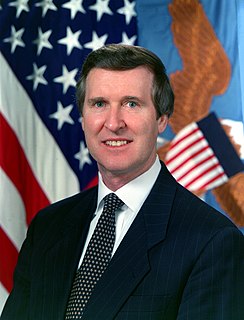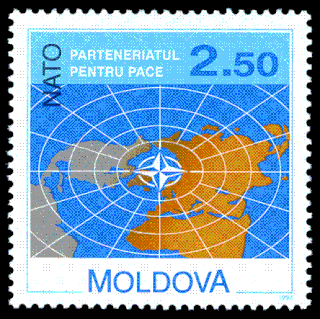
The Slovenian Armed Forces or Slovenian Army are the armed forces of Slovenia. Since 2003, it is organized as a fully professional standing army. The Commander-in-Chief of the SAF is the President of the Republic of Slovenia, while operational command is in the domain of the Chief of the General Staff of the Slovenian Armed Forces.
Partnership for Peace Information Management System (PIMS) is a US Department of Defense Bilateral Cooperative Development Program started in 1996 to enable collaboration and communication between Partnership for Peace (PfP) countries and the NATO community.

The United States Under Secretary of Defense for Policy (USDP) is a high level civilian official in the United States Department of Defense. The Under Secretary of Defense for Policy is the principal staff assistant and adviser to both the Secretary of Defense and the Deputy Secretary of Defense for all matters concerning the formation of national security and defense policy.

The Air War College (AWC) is the senior Professional Military Education (PME) school of the U.S. Air Force. A part of the United States Air Force's Air University, AWC emphasizes the employment of air, space, and cyberspace in joint operations. Headquartered at Maxwell Air Force Base in Montgomery, Alabama, its higher headquarters is the Air Education and Training Command (AETC) at Randolph Air Force Base in San Antonio, Texas. It is one of six war colleges within the U.S. Department of Defense's Joint Professional Military Education (JPME) Phase II Education Program for commissioned officers.
The Istanbul Cooperation Initiative (ICI) is an initiative launched during NATO's 2004 Istanbul summit.
The International Association for Military Pedagogy (IAMP) was founded in November 2005 in Strausberg (Germany) as a successor to the European Military Pedagogy Forum (EMPF).
Connections: The Quarterly Journal is a peer-reviewed open access academic journal covering security, defense, armed forces, conflict, intelligence, history, war, and related issues. It was established in 2002 by the Partnership for Peace Consortium of Defense Academies and Security Studies Institutes and is published in English in both hardcover and PDF. The journal is also published in Russian. Editorial decisions are made by the journal's editorial board under the guidance of the PfP Consortium's Senior Advisory Council (SAC). Members of SAC are the commandants of the defense academies of Austria, Bulgaria, Canada, Poland and Sweden, the director of the George C. Marshall European Center for Security Studies, senior representatives of NATO and DCAF, and the executive director of the Consortium.

The NATO School Oberammergau in southern Germany is NATO's key training facility on the operational level. The School started with two courses in 1953 and now offers over 100 different courses to Alliance members and partners on subjects related to NATO's policies, strategies, missions and operations.
The Geneva Centre for Security Policy (GCSP) is an international foundation that was established in 1995 under Swiss law to "promote the building and maintenance of peace, security and stability". The GCSP was founded by the Federal Department of Defence, Civil Protection and Sports in cooperation with the Federal Department of Foreign Affairs as a Swiss contribution to Partnership for Peace (PfP).
The National Defense University College of Information and Cyberspace (CIC) -- formerly the Information Resources Management College (IRMC) or NDU iCollege—is a U.S. Department of Defense graduate school working to inform leaders of the United States from the government and the private sector. A unit of the National Defense University (NDU), it is located at Fort McNair, Washington, DC. As a trusted voice in the information resource management community, NDU CIC is recognized for its excellent graduate-level programs, faculty, and services that provide a strategic advantage for today’s military and civilian leaders in the United States Department of Defense and across government. The Chancellor of the NDU CIC, RADM Jan Hamby, USN (Ret.), provides strategic direction and vision for all faculty, staff, and students. The Dean of Faculty and Academic Programs, Tom Wingfield, oversees faculty, curriculum, and instruction. The Dean of Administration, Russell Quirici, oversees operational support for the College. The Dean of Students, COL Matt Hergenroeder, oversees the Office of Student Services and all student matters."

CIMBA Italy is a study abroad program in Italy that offers study abroad and degree opportunities for undergraduate, MBA, and Executive-level students. Coursework focuses on American-style learning in business, leadership, journalism, communication, and engineering. CIMBA has a campus in Paderno del Grappa in the Veneto region of northern Italy.
The Center for Homeland Defense and Security at the Naval Postgraduate School (NPS) in Monterey, California is a school focusing on homeland security education.

The Ministry of Defense of the Republic of Azerbaijan is the Azerbaijani government ministry, associated with the Azerbaijani military. The ministry is responsible for keeping Azerbaijan defended against external threats, preserving its territorial integrity, waging war on behalf of Azerbaijan, and the surveillance of the Azerbaijani sector of Caspian Sea sea and airspace. The Minister of Defense is appointed and removed from the post by the Commander-in-chief of the Azerbaijani Armed Forces, President of Azerbaijan.

In the United States, the Assistant Secretary of Defense for International Security Affairs or ASD (ISA) is the principal advisor to the Under Secretary of Defense for Policy and the United States Secretary of Defense on international security strategy and policy on issues of Department of Defense (DoD) interest related to the governments and defense establishments of the nations and international organizations of Europe, the Middle East, and Africa. The ASD (ISA) also oversees security cooperation programs and foreign military sales programs in these regions. Despite the broad title of the office, the ASD (ISA) does not develop policy related to Asia, the Pacific region, Latin America, or South America.
The U.S. Department of State’s Bureau of Political-Military Affairs manages the Global Security Contingency Fund (GSCF). A joint program with the U.S. Department of Defense, GSCF is an effective and flexible tool to address urgent security challenges and seize emerging opportunities that further U.S. foreign policy and national security interests by strengthening our partners’ capabilities to conduct border and maritime security, internal defense, counterterrorism, and other authorized operations.
The International Security Forum (ISF) is a Swiss government sponsored international conference on security policy in Europe, North America, and beyond. The biannual forum is held alternately in Zurich and Geneva.

NATO Defense College (NDC) is the international military college for North Atlantic Treaty Organization countries in Rome, Italy.
Azerbaijan has been ruled by the former Soviet Union for nearly 70 years. Azerbaijan gained its independence in October 1991 following the fall of the Soviet Union. Reestablishment of independent country has led to chaos and regression in the field of economy, education and health. In this regard, the Azerbaijani government signed the "Contract of century" and implemented reforms to develop the above-mentioned fields.

The relationship between Azerbaijan and NATO started in 1992 when Azerbaijan joined newly created North Atlantic Cooperation Council. Considerable partnership between NATO and Azerbaijan dates back to 1994, when the latter joined Partnership for Peace program. Azerbaijan established a diplomatic Mission to NATO in 1997 by the Presidential Decree on 21 November.














